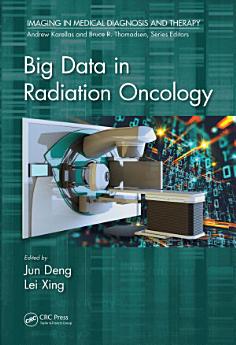Big Data in Radiation Oncology
关于此电子书
- Offers the first focused treatment of the role of big data in the clinic and its impact on radiation therapy.
- Covers applications in cancer registry, radiomics, patient safety, quality of care, treatment planning, decision making, and other key areas.
- Discusses the fundamental principles and techniques for processing and analysis of big data.
- Address the use of big data in cancer prevention, detection, prognosis, and management.
- Provides practical guidance on implementation for clinicians and other stakeholders.
Dr. Jun Deng is a professor at the Department of Therapeutic Radiology of Yale University School of Medicine and an ABR board certified medical physicist at Yale-New Haven Hospital. He has received numerous honors and awards such as Fellow of Institute of Physics in 2004, AAPM Medical Physics Travel Grant in 2008, ASTRO IGRT Symposium Travel Grant in 2009, AAPM-IPEM Medical Physics Travel Grant in 2011, and Fellow of AAPM in 2013.
Lei Xing, Ph.D., is the Jacob Haimson Professor of Medical Physics and Director of Medical Physics Division of Radiation Oncology Department at Stanford University. His research has been focused on inverse treatment planning, tomographic image reconstruction, CT, optical and PET imaging instrumentations, image guided interventions, nanomedicine, and applications of molecular imaging in radiation oncology. Dr. Xing is on the editorial boards of a number of journals in radiation physics and medical imaging, and is recipient of numerous awards, including the American Cancer Society Research Scholar Award, The Whitaker Foundation Grant Award, and a Max Planck Institute Fellowship.
作者简介
Jun Deng, PhD, is a professor at the Department of Therapeutic Radiology of Yale University School of Medicine and an American Board of Radiology board-certified medical physicist at Yale New Haven Hospital. Dr. Deng obtained his PhD from the University of Virginia in 1998 and finished his postdoctoral fellowship at the Department of Radiation Oncology of Stanford University in 2001. Dr. Deng joined Yale University’s Department of Therapeutic Radiology as a faculty physicist in 2001. Dr. Deng serves on the editorial boards of numerous peer-reviewed journals and has served on study sections of the NIH, DOD, ASTRO, and RSNA since 2005 and as a scientific reviewer for the European Science Foundation and the Dutch Cancer Society since 2015. Dr. Deng has received numerous honors and awards such as Fellow of Institute of Physics in 2004, AAPM Medical Physics Travel Grant in 2008, ASTRO IGRT Symposium Travel Grant in 2009, AAPM-IPEM Medical Physics Travel Grant in 2011, and Fellow of AAPM in 2013. At Yale, Dr. Deng’s research has focused on big data, machine learning, artificial intelligence, and medical imaging for early cancer detection and prevention. In 2013, his group developed CT Gently®, the world’s first iPhone App that can be used to estimate organ doses and associated cancer risks from CT and CBCT scans. Recently, funded by an NIH R01 grant, his group has been developing a personal organ dose archive (PODA) system for personalized tracking of radiation doses in order to improve patient safety in radiation therapy.
Lei Xing, PhD, is currently the Jacob Haimson Professor of Medical Physics and Director of the Medical Physics Division of the Radiation Oncology Department of Stanford University. Dr. Xing obtained his PhD in Physics from the Johns Hopkins University in 1992 and received his Medical Physics training at the University of Chicago. He has been a member of the Radiation Oncology faculty at Stanford since 1997. He is also an affiliated faculty member in Stanford’s Department of Electrical Engineering, the Biomedical Informatics Program, the Molecular Imaging Program at Stanford, and the Bio-X program. His research has focused on inverse treatment planning, tomographic image reconstruction, CT, optical and PET imaging instrumentations, image-guided interventions, nanomedicine, and applications of molecular imaging in radiation oncology. Dr. Xing is an author on more than 250 peer-reviewed publications, a co-inventor on many issued and pending patents, and a co-investigator or principal investigator on numerous NIH, DOD, NSF, and ACS grants and projects from other funding agencies and corporations. He and his lab members have received numerous awards from ACS, AAPM, ASTRO, WMIC, and RSNA in the past decade. Dr. Xing serves on the editorial boards of a number of journals in radiation physics and medical imaging and is a recipient of numerous awards, including the American Cancer Society Research Scholar Award, The Whitaker Foundation Grant Award, and a Max Planck Institute Fellowship.






